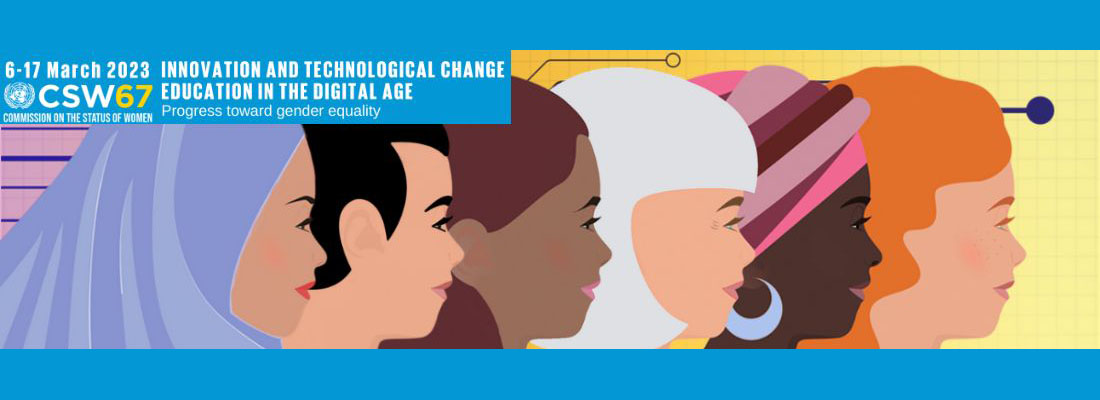IBA to host two events at 67th United Nations Commission on the Status of Women

The International Bar Association (IBA) is hosting two virtual side-events during the 67th session of the United Nations Commission on the Status of Women (UNCSW67), which is taking place from 6–17 March 2023. The IBA Access to Justice and Legal Aid Committee and Women Lawyers' Committee will be leading online discussions on Access to Justice – a Sine Qua Non for Inclusion and Equality on Thursday 9 March and The Rural Woman and Technological Advancement: Sustainable Legal Stratagems on Monday 13 March, respectively.
IBA President Almudena Arpón de Mendívil Aldama, and the IBA’s immediate past president Sternford Moyo, will be speaking at the second discussion on rural women. Links to watch the events appear below, as do the speakers’ details.
Thursday 9 March, 0900 EST – Zoom link: tinyurl.com/2pbt38vn
Access to Justice – a Sine Qua Non for Inclusion and Equality
Hosted by the IBA Access to Justice and Legal Aid Committee
Speakers:
- Keynote: Professor Joy Ezeilo, Activist and legal scholar; Founder, Women Aid Collective, Tamar Sexual Assault Referral Centre and the West African Women’s Rights Coalition, Nigeria
- Isabel Bueno, Partner, Mattos Filho, Brazil
- Ene Obi, Governance Team Leader, ActionAid, Nigeria
- Carolina Ríos Villota, President, Federación Internacional de Abogadas (FIDA), Colombia
- Mary Walker, Barrister, 9 Wentworth Chambers, Australia
Lead officer:
- Dr Rosemary Chikwendu, Managing Partner, Chikwendu Law, Nigeria; Secretary, IBA Access to Justice and Legal Aid Committee
Speaking in advance of the event, Dr Chikwendu noted: ‘Creating an inclusive, equitable society where everyone’s fundamental rights are respected simply cannot be achieved without improved access to justice. Certain groups of society, including women, can feel marginalised from the justice system for several intersecting reasons. It is vital that we move away from this and ensure that legal aid and justice are easily accessible for all, no matter the circumstances. The IBA Access to Justice and Legal Aid Committee is proud to be furthering discussions during the 67th session of the United Nations Commission on the Status of Women.’
Monday 13 March, 1200 EST – Zoom link: tinyurl.com/2p9ejnyb
The Rural Woman and Technological Advancement: Sustainable Legal Stratagems
Sponsored by the IBA Women Lawyers’ Committee, in collaboration with the International Federation of Women Lawyers (FIDA), African Women Lawyers Association (AWLA), Ayede Ogbese Women Vanguard, International Alliance of Women, and TRLPLAW
Speakers:
- Almudena Arpon De Mendivil Aldama, IBA President; Partner, Gómez-Acebo & Pombo, Spain
- Joanna Manganara, Honorary President, International Alliance of Women, Greece
- Sternford Moyo, IBA Immediate Past President; Senior Partner and Chairman, SCANLEN & HOLDERNESS, Zimbabwe
- HRM King Ajibola Oluyede, Ayede Ogbese Monarchy, Ondo State, Nigeria; Founding Principal, TRLPLAW, Nigeria
- Dr Fiona Sampson, Founding Chief Executive Officer, The Equality Effect, Canada
Lead officer:
- Olufunmi Oluyede, Co-Founding Senior Partner, TRLPLAW, Nigeria; Member, IBA Women Lawyers' Committee Advisory Board
Ahead of the discussion, Ms Oluyede stated: ‘Women from rural communities face particular challenges in their lives, a lack of access to technology being one of them. As UN Women notes, “Rural women are key agents for achieving the transformational economic, environmental and social changes required for sustainable development.” However, rural women cannot implement these positive changes without improved access to education, healthcare and of course, technology. This is where the international legal community can play an instrumental role, through the implementation of legal strategies to improve rural women’s access to the fundamental infrastructure of society.’
The 67th UNCSW will focus on two main themes: innovation, technological change and education in the digital age for achieving gender equality and the empowerment of women and girls; and challenges in achieving gender equality and the empowerment of rural women and girls.
ENDS
Notes to the Editor
- Related links:
The International Bar Association (IBA), the global voice of the legal profession, is the foremost organisation for international legal practitioners, bar associations and law societies. Established in 1947, shortly after the creation of the United Nations, it was born out of the conviction that an organisation made up of the world's bar associations could contribute to global stability and peace through the administration of justice.
- Find the IBA on social media here:
IBA (@IBAnews)
twitter.com/IBAnews
twitter.com/IBAevents
www.facebook.com/internationalbarassociation
www.linkedin.com/company/international-bar-association
For further information please contact:
Romana St. Matthew-Daniel
Press Office
International Bar Association
5 Chancery Lane
London WC2A 1LG
United Kingdom
Mobile: +44 (0)7940 731 915
Direct Line: +44 (0)20 7842 0094
Main Office: +44 (0)20 7842 0090
Fax: +44 (0)20 7842 0091
Email: romana.daniel@int-bar.org
Email: IBApressoffice@int-bar.org
Website: www.ibanet.org
Website page link for this news release:
Short link: tinyurl.com/yckv37s3
Full link: www.ibanet.org/IBA-to-host-two-events-at-67th-United-Nations-Commission-on-the-Status-of-Women